China Celebs
Six Years after Chinese Pop Star Zhang Muyi (24) Declared Love for 12-Year-Old Miki Akama, They’re Now Tying the Knot
Zhang Muyi became her music coach when Miki Akama was only 8 years old. A decade later, the couple announces their wedding on Weibo.
Published
7 years agoon
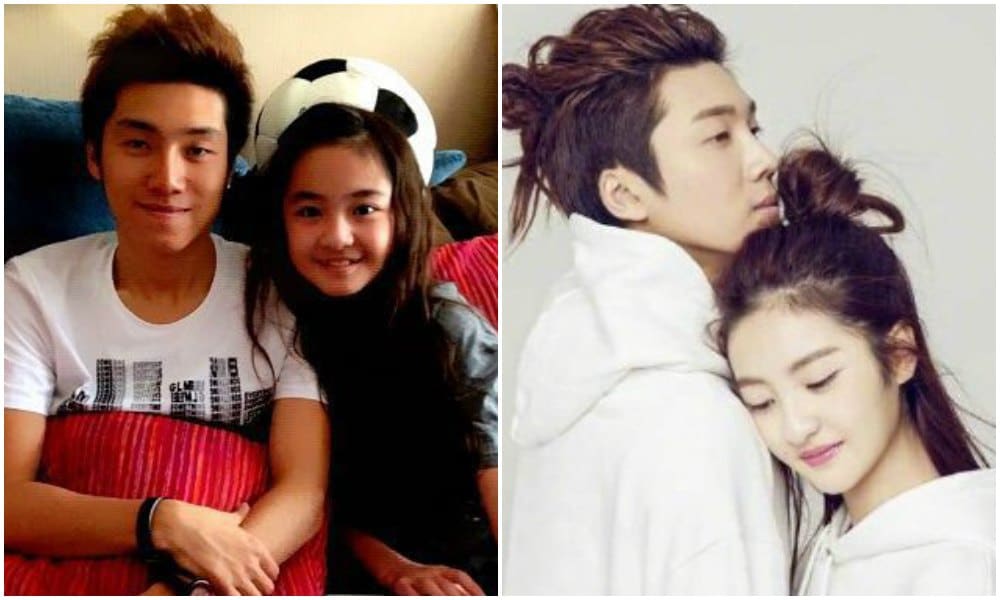
Six years after Chinese pop star Zhang Muyi (1987) publicly declared his love for the then 12-year-old music pupil Miki Akama (2000), the two have now announced their wedding on Weibo. Although some say their love is meant-to-be, others say it is a case of pedophilia.
In 2012, it made international headlines when the then 24-year-old Chinese popstar Zhang Muyi publicly declared his love for 12-year-old Canada-born model Miki Akama.
The two met when Zhang Muyi was hired to be Miki’s music coach when she was only 8 years old. In 2012, Muyi wrote on Weibo that he “simply couldn’t wait” for Miki’s next four birthdays to pass, saying he was “counting down each one.”
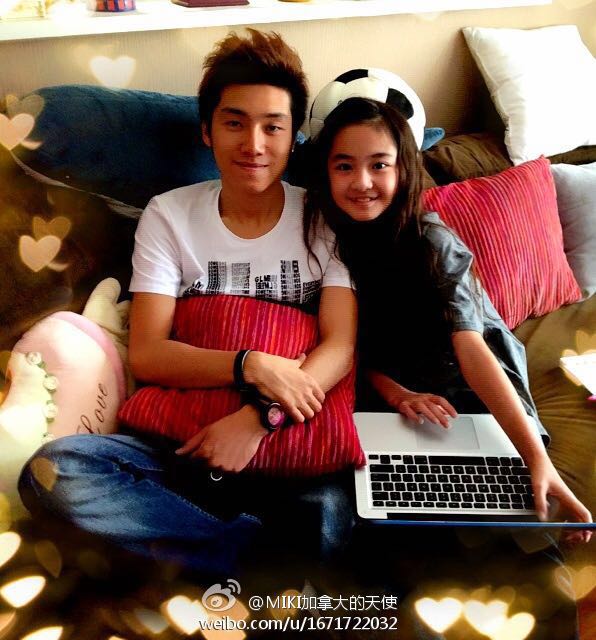
24-year-old Zhang and 12-year-old Miki in 2012.
At the time, the 12-year-old Miki, whose mother is Chinese/German and whose father is Japanese, had already built up a fanbase of 500,000 followers on Weibo. She replied to Zhang, saying: “Wait until I’m old enough to marry you, and then I’m going to say “I do”.’
Six years later, the now 30-year-old Zhang Muyi (@张木易, 1.4 million followers on Weibo), and the 17-year-old Miki Akama (@张千巽, 1.8 million Weibo fans) have announced their wedding through social media.
On April 4, Zhang wrote on Weibo: “You’ve made me see the most beautiful picture in this world,” adding a photo of a wedding dress. Miki responded to the post, writing: “You make me as beautiful as I can be.”
He later added: “We are indeed preparing for our wedding in all kinds of ways. On September 11, 2018, Miki will turn 18, and it will be ten years since we first met.”
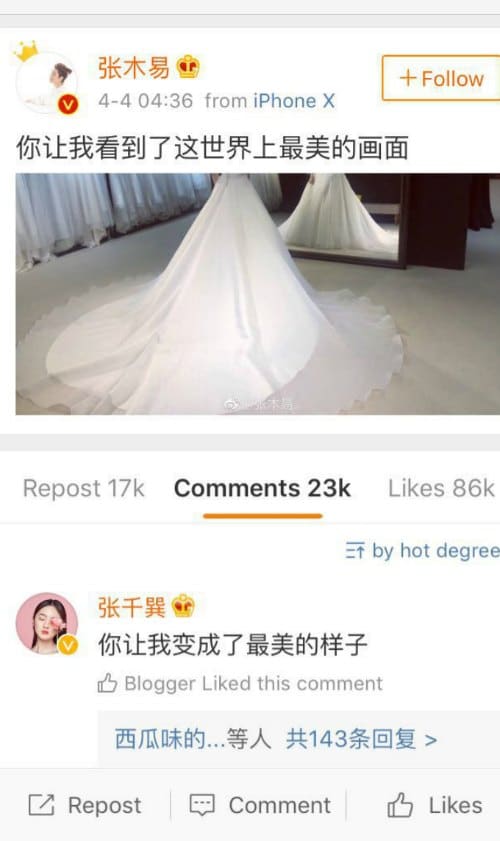
The wedding announcement prompted a wave of reactions. Within 48 hours after the post, Zhang’s photo had received 23,800 responses and nearly 18,000 shares. The couple became one of the most-searched hot topics on social media in China on April 6, and the hashtag “Zhang Muyi and Miki Akama Getting Married” (#张木易张千巽结婚#) received more than 85 million views by Friday.
Although there are many netizens who wish the couple a happy life and find their story romantic, there are also many opponents who think the base of the couple’s relationship is unhealthy.

Weibo account @LoveMatters (an account affiliated to RNW Media) writes:
“In most parts of the world, it is hard to give blessing to a relationship between a teacher and their student. The fundamental reason for this is that there is an unequal power relation between teachers and students, which makes it difficult to speak of an equal and truly harmonious connection between two people. Let alone if one of the two persons is underage; this further intensifies the unequal relationship in terms of knowledge and experience. Let’s not even focus on whether or not this is pedophilia.”
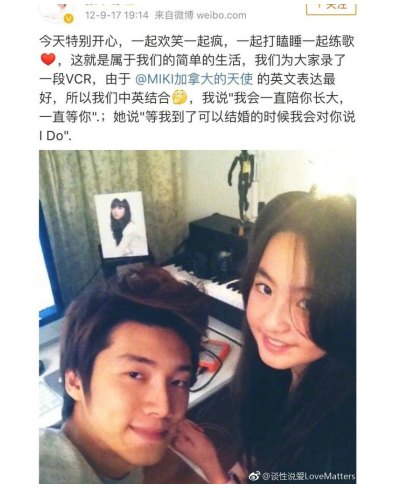
“We should discuss this from the angle of pedophilia,” one netizen responds: “Because even though it is now disguised as ‘romantic love’, its base still essentially is the relationship between an adult and an 8-year-old girl.”
Many others also say that this a “white-washing of pedophilia,” with some expressing that it makes them “feel like vomiting.”

In response to the controversy, Miki addressed their engagement on Weibo in a lengthy blog post.
In her statement, Miki expresses the shock at the negativity surrounding their wedding engagement, saying that people are “turning this story into something they want it to be,” and that they are downgrading her to a “brainless girl” who has been “living in the dark” all her life.
“I do want to correct something,” she writes:
“There are people who are changing our story and are using the fact that I was 8 years old [when we met], and in doing so, are harming us and our loved ones. In their articles, they are deleting the part that really matters: When I was 8, I met Muyi and he was my music teacher; teaching me how to sing and teaching me self-confidence. By the time I was 12, my parents had let me read many books and see many movies, and I had a good education at school. Many of my friends with the same age as me had started reaching puberty and I also started to think about who I liked. I could talk to Muyi about everything. He said that when I would reach the age of dating, he would help me check them out. At the time I did not understand what it meant, and he said he would not let me date bad guys, because it is very easy for people to get hurt. Looking back now, Muyi was also still young at that time, so I told him that if he did not want me to get hurt in the future, he should just marry me. At the time we were just joking around, like playing house. With that uncomplicated promise, I grew up with him by my side. Of course, we will stay pure until marriage.”
Regardless of Miki’s statement, many netizens still hold their own opinions about the matter. Some compare Zhang and Miki to the case of the Taiwan lyricist Li Kuncheng (李坤城) and his wife Lin Jingen (林靖恩, 1996).
The couple became a big topic of discussion in 2015, when the then 58-year-old Li tied the knot with the then 18-year-old Lin.

Li Kuncheng with his 40 year younger fiancee in 2015, image via Asianpopnews.com.
About Zhang and Miki, one commenter writes: “I don’t think this is as serious as pedophilia. The goal of pedophilia is unpure [sex], but they have been together a long time. Zhang has no evil intentions.”
Still, many people express their worries about the situation, wondering “where the parents are” in this, and saying that they do not want their own children to be influenced by this.
By now, some experts and KOL (Key Opinion Leaders) have also gotten involved in the matter. While influential Nanjing police officer Wang Haiding (王海丁, @江宁婆婆) condemns the relationship, famous Chinese sexologist Li Yinhe (@李银河) says it does not meet the criteria of pedophilia.
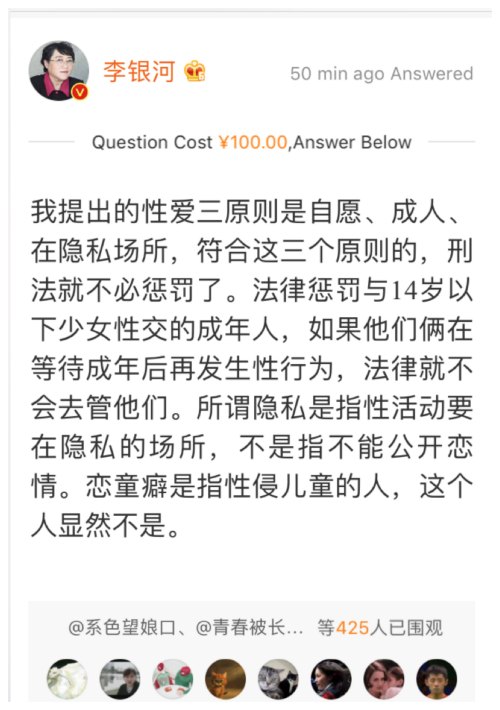
Renowned Chinese sexologist Li Yinhe answers a question on Weibo about whether this is pedophilia or not.
“The three principles of sex that I have proposed are that it is is voluntary, between adults, and in private. If it is in line with these three principles, it is not punishable by law. The law can punish adults who have sex with girls under the age of 14, but if they wait with having sex until they are both adults, then the law cannot control them. (..) Pedophiles are people who sexually assault children. This is clearly not the case here.”
Amidst all controversy and analyses, many netizens just jokingly say: “I’m also ready to meet my future spouse – too bad they’re still in kindergarten.”
UPDATE – see our latest video about this topic here:
By Manya Koetse and Boyu Xiao
Follow @whatsonweibo
Spotted a mistake or want to add something? Please let us know in comments below or email us.
©2018 Whatsonweibo. All rights reserved. Do not reproduce our content without permission – you can contact us at info@whatsonweibo.com.
Boyu Xiao is an MPhil graduate in Asian Studies (Leiden University/Peking University) focused on modern China. She has a strong interest in feminist issues and specializes in the construction of memory in contemporary China.

China Celebs
Explaining China’s Collective Grief Over the Death of ‘Big S’ Barbie Hsu
Published
4 weeks agoon
February 11, 2025
FROM THE WEIBO WATCH PREMIUM NEWSLETTER
The death of Barbie Hsu (徐熙媛) has sent shockwaves across Chinese social media. Her unexpected passing, along with the circumstances surrounding it, quickly became the most talked-about topic on Chinese social media in early February.
Barbie Hsu (1976) is generally known as “Big S” (大S) in China. The Taiwanese actress, singer, and TV host is one of those people who just always seemed to be around. She wasn’t just frequently a trending topic on Chinese social media but was also a household name, together with her sister, in the world of China’s pop culture and entertainment.
Most people will know Hsu because of the famous 2001 Taiwanese series Meteor Garden (流星花园), in which she played the award-winning role of female protagonist Shan Cai (杉菜). That role also made her famous outside of China, as the series became popular in South Korea, Singapore, the Philippines, Malaysia, and beyond.
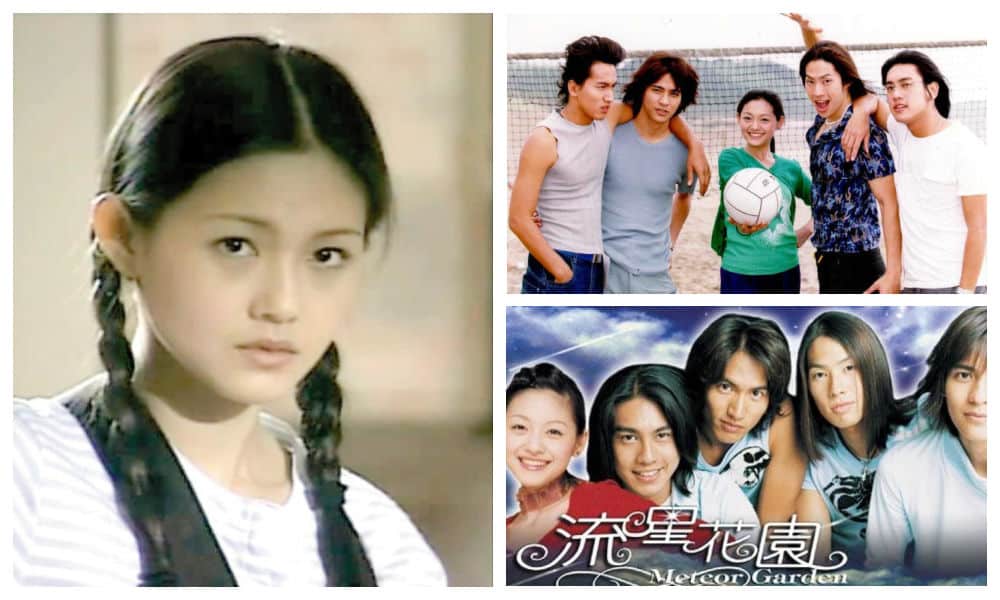
But her career had taken off years before that success. Together with her sister Dee Hsu (徐熙娣, “Little S” 小S), she formed the pop duo SOS (later “ASOS”) in the 1990s. The name stood for Sisters Of Shu (alternative spelling of Hsu), and was the source of their “Big S” and “Little S” nicknames.
She later made a switch to movies and was a TV host and a singer. While her sister Dee Shu gained recognition as the humorous host of the long-running talk show Kangxi Coming (康熙來了), Barbie Hsu also served as a stand-in host or guest on that show, as well as many others.
Besides her professional life, it was often Hsu’s private life that brought her to the top of Weibo’s trending charts. Her marriage to mainland Chinese businessman Wang Xiaofei (汪小菲)—with whom she had a daughter and a son in 2014 and 2016—frequently made headlines. The couple even participated in a reality show, and Hsu’s private life began to take on Kardashian-like proportions. The two were rumored to bicker over money issues after Wang opened S Hotel, a boutique hotel in Taipei designed by Philippe Starck and named after his wife.
Following their separation in 2021, much of the messy divorce drama between the two played out on Weibo and became the biggest celebrity topic of 2022. The ongoing drama started when Hsu accused her ex-husband of failing to pay alimony, with the accumulated amount allegedly exceeding NT$5 million (US$160,000). Wang Xiaofei then publicly and angrily responded to Hsu’s accusations with multiple emotional posts on his Weibo account, where he had over seven million followers. Everyone and everything got dragged into the drama, from Wang’s mother Zhang Lan (张兰) to Hsu’s new partner, South Korean musician DJ Koo Jun-Yup.
Hsu’s health and frail body also made headlines at times. In 2018, she was hospitalized after a epileptic fit brought on by a cold. Besides epilepsy, Hsu suffered from a chronic heart condition (mitral valve prolapse). In late January of this year, she traveled to Japan for the Chinese New Year and caught influenza during her trip. Her health deteriorated rapidly within just five days, and she passed away on February 2nd from influenza-induced pneumonia. She was only 48 years old.
The news of her death has had a massive impact on Chinese social media. On Weibo, the hashtag ‘Big S has Passed Away’ (#大S去世#) has garnered over 3.3 billion views within six days.
While the initial reaction was one of shock over her sudden passing, various other aspects of her life, legacy, and the circumstances surrounding her death have sparked broader discussions, turning it into a widely debated topic—one that many find particularly heartbreaking for various reasons.
➡️ As Barbie Hsu has been in the public eye for decades, many grew up watching her and following her for over 25 years. Even those who were not particularly fans of Hsu are now coming forward to express collective grief and nostalgia over her passing—like losing a piece of their younger self.
Similarly, the passing of the beloved pop star Coco Lee in 2023 also made people collectively reflect on a bygone era of Chinese pop culture that defined the youth of millions. Like Lee, Barbie Hsu was a big part of early 2000s Chinese pop culture. Some people admit that Hsu’s passing has left them crying for days.
Many netizens expressed grief not just for her death but also for the fading of a time when Taiwanese idol dramas and their own carefree youth were at their peak.
“I was in fifth grade when Meteor Garden aired, and I remember running home after school to watch it. I saved up 60 kuai ($8.6) to buy the DVD,” one Weibo user shared. “Such a lively and bold woman has suddenly disappeared, an entire generation’s youth and memories,” another person wrote.
➡️ The death of Barbie Hsu and the sudden, rapid progression of her illness—from influenza to fatal pneumonia—has raised awareness this week about the potential dangers of the flu. It has also triggered some public anxiety about the latest outbreak in Japan, which is experiencing its largest flu surge in 25 years, and how influenza is treated in the country.
Many are questioning why such a wealthy, well-known celebrity couldn’t receive effective treatment in Japan, a country generally perceived to have an advanced healthcare system. While it remains unclear how her condition deteriorated so quickly—especially since she allegedly appeared well and energetic at a January 25 banquet—it may not have helped that Hsu was in Hakone, an area without major hospitals like those in Kyoto or Tokyo. According to various media reports, Hsu sought medical assistance in the days leading up to her death but was not admitted to any hospital during that time.
In light of this incident, others also share their struggles with healthcare in Japan, claiming that costs and language barriers previously prevented them from receiving proper care while traveling there and falling ill.
➡️ Perhaps the strongest online response to Barbie Hsu’s death is related to gender dynamics, touching on topics such as feminism, misogyny, and patriarchy.
Many netizens argue that, despite always sacrificing herself for others, Hsu did not receive the love and care she deserved. The aftermath of her divorce from Wang Xiaofei left permanent scars on the superstar. Throughout her long career, Hsu consistently supported her family and became a family pillar and breadwinner. While navigating the harsh environment of the entertainment industry, she pushed herself and her body to the limits. Despite her efforts, she was always judged for her looks and body weight, and was later bullied and humiliated by her ex-husband.
A recurring sentiment among commenters, especially on Xiaohongshu, is that women, both in public and private life, are often overburdened while receiving little in return. Many pointed out that if someone as beautiful and successful as “Big S” could suffer under the burden of caregiving and the toxicity of the men around her, what hope is there for ordinary women?
At the same time, Hsu is also praised as an example of self-empowerment for all she accomplished, and as a reminder that taking good care of yourself is more important than seeking the validation of others.
➡️ On Weibo, the people expressing their grief over Hsu’s passing are also reflecting on the fragility of life. Notably, Hsu’s WeChat tag at the time of her death read, “Death is inevitable” (“死亡是必然的”).
In a past interview, she said: “Death is not scary. What’s scary is not being able to die. Aging is not scary. What’s scary is living forever.” (“死不可怕。可怕的是死不了。老不可怕。可怕的是长生不老。”)
By Manya Koetse
(follow on X, LinkedIn, or Instagram)
Spotted a mistake or want to add something? Please let us know in comments below or email us. First-time commenters, please be patient – we will have to manually approve your comment before it appears.
©2025 Whatsonweibo. All rights reserved. Do not reproduce our content without permission – you can contact us at info@whatsonweibo.com.
China Arts & Entertainment
Controversial Wanghong Livestreamers Are Becoming a Weibo Staple in China
‘Wanghong’ was a mark of online fame; now, it’s increasingly tied to controversy and scandal.
Published
4 months agoon
October 27, 2024
As livestreaming continues to gain popularity in China, so do the controversies surrounding the industry. Negative headlines involving high-profile livestreamers, as well as aspiring influencers hoping to make it big, frequently dominate Weibo’s trending topics.
These headlines usually revolve around China’s so-called wǎnghóng (网红) influencers. Wanghong is a shortened form of the phrase “internet celebrity” (wǎngluò hóngrén 网络红人). The term doesn’t just refer to internet personalities but also captures the viral nature of their influence—describing content or trends that gain rapid online attention and spread widely across social media.
Recently, an incident sparked debate over China’s wanghong livestreamers, focusing on Xiaohuxing (@小虎行), a streamer with around 60,000 followers on Douyin, who primarily posts evaluations of civil aviation services in China.

Xiaohuxing (@小虎行)
On October 15, 2024, at Shenzhen Bao’an International Airport, Xiaohuxing confronted a volunteer at the automated check-in counter, insisting she remove her mask while livestreaming the entire encounter. He was heard demanding, “What gives you the right to wear a mask? What gives you the right not to take it off?” and even attempted to forcibly remove her mask, challenging her to call the police.

During the livestream, the livestreamer confronted the woman on the right for wearing a facemask.
He also argued with a male traveler who tried to intervene. In the end, the airport’s security officers detained him. Shortly after the incident, a video of the livestream went viral on Weibo under various hashtags (e.g. #网红小虎行机场强迫志愿者摘口罩#) and attracted millions of views. The following day, Xiaohuxing’s Douyin account was banned, and all his videos were removed. The Shenzhen Public Security Bureau later announced that the account’s owner, identified as Wang, had been placed in administrative detention.
On October 13, just days before, another livestreaming controversy erupted at Guangzhou Baiyun International Airport. Malatang (@麻辣烫), a popular Douyin streamer with over a million followers, secretly filmed a young couple kissing and mocked them, continuing to film while passing through security—an area where filming is prohibited.
Her livestream quickly went viral, sparking discussions about unauthorized filming and misconduct among Chinese wanghong. In response, Malatang’s agent posted an apology video. However, the affected couple hired a lawyer and reported the incident to the police (#被百万粉丝网红偷拍当事人发声#). On October 17, Malatang’s Douyin account was banned, and her videos were removed.

Livestreamer Malatang making fun of the couple in the back at the airport.
In both cases, netizens uncovered additional examples of inappropriate behavior by Xiaohuxing and Malatang in past broadcasts. For example, Xiaohuxing was reportedly aggressive towards a flight attendant, demanding she kneel to serve him, while Malatang was criticized for scolding a delivery person who declined to interact with her on camera.
Comments on Weibo included, “They’ll do anything for traffic. Wanghong are getting a bad reputation because of people like this.” Another added, “It seems as if ‘wanghong’ has become a negative term now.”
Rising Scrutiny in China’s Wanghong Economy
Xiaohuxing and Malatang are far from isolated cases. Recently, many other wanghong livestreamers have also been caught up in negative news.
One such figure is Dong Yuhui (董宇辉), a former English teacher at New Oriental (新东方) who transitioned to livestreaming for East Buy (东方甄选), where he mixed education with e-commerce (read here). Dong gained significant popularity and boosted East Buy’s brand before leaving to start his own company. Recently, however, Dong faced backlash for inaccurate statements about Marie Curie during an October 9 livestream. He incorrectly claimed that Curie discovered uranium, invented the X-ray machine, and won the Nobel Prize in Literature, among other things.
Considering his public image as a knowledgeable “teacher” livestreamer, this incident sparked skepticism among viewers about his actual expertise. A related hashtag (#董宇辉称居里夫人获得诺贝尔文学奖#) garnered over 81 million views on Weibo. In addition to this criticism, Dong is also being questioned about potential false advertising, which is a major challenge for all livestreamers selling products during their streams.

Dong Yuhui (董宇辉) during one of his livestreams.
Another popular livestreamer, Dongbei Yujie (@东北雨姐), is currently also facing criticism over product quality and false advertising claims. Originally from Northeast China, Dongbei Yujie shares content focused on rural life in the region. Recently, her Douyin account, which boasts an impressive 22 million followers, was muted due to concerns over the quality of products she promoted, such as sweet potato noodles (which reportedly contained no sweet potato). Despite issuing public apologies—which have garnered over 160 million views under the hashtag “Dongbei Yujie Apologizes” (#东北雨姐道歉#)—the controversy has impacted her account and led to a penalty of 1.65 million yuan (approximately 231,900 USD).

From Dongbei Yujie’s apology video
Former top Douyin livestreamer Fengkuang Xiaoyangge (@疯狂小杨哥) is also facing a career downturn. Leading up to the 2024 Mid-Autumn Festival, he promoted Hong Kong Meicheng mooncakes in his livestreams, branding them as a high-end Hong Kong product. However, it was soon revealed that these mooncakes had no retail presence in Hong Kong and were primarily produced in Guangzhou and Foshan, sparking accusations of deceptive marketing. Due to this incident and previous cases of misleading advertising, his company came under investigation and was penalized. In just a few weeks, Fengkuang Xiaoyangge lost over 8.5 million followers (#小杨哥掉粉超850万#).

Fengkuang Xiaoyangge (@疯狂小杨哥) and the mooncake controversy.
It’s not only ecommerce livestreamers who are getting caught up in scandal. Recently, the influencer “Xiaoxiao Nuli Shenghuo” (@小小努力生活) and her mother were arrested for fabricating a tragic story – including abandonment, adoption, and hardships – to gain sympathy from over one million followers and earn money through donations and sales. They, and two others who helped them manage their account, were sentenced to ten days in prison for ‘false advertising.’
Wanghong Fame: Opportunity and Risk
China’s so-called ‘wanghong economy’ has surged in recent years, with countless content creators emerging across platforms like Douyin, Kuaishou, and Taobao Live. These platforms have transformed interactions between content creators and viewers and changed how products are marketed and sold.
For many aspiring influencers, becoming a livestreamer is the first step to building a presence in the streaming world. It serves as a gateway to attracting traffic and potentially monetizing their online influence.
However, before achieving widespread fame, some livestreamers resort to using outrageous or even offensive content to capture attention, even if it leads to criticism. For example, before his account was banned, Xiaohuxing set his comment section to allow only followers to comment, gaining 3,000 new followers after his controversial livestream at Shenzhen Airport went viral. Many speculated that some followers joined just to leave critical comments, but it nonetheless grew his following.
As livestreamers gain significant fame, they must exercise greater caution, as they often hold substantial influence over their audiences, making accuracy essential. Mistakes, whether intentional or not, can quickly erode trust, as seen in the example of the super popular Dong Yuhui, who faced backlash after his inaccurate comment about Marie Curie sparked public criticism.
China’s top makeup livestreamer, Li Jiaqi (李佳琦), experienced a similar reputational crisis in September last year. Responding dismissively to a viewer who commented on the high price of an eyebrow pencil, Li replied, “Have you received a raise after all these years? Have you worked hard enough?” Commentators pointed out that the pencil’s cost per gram was double that of gold at the time. Accused of “forgetting his roots” as a former humble salesman, Li lost one million Weibo followers in a day (read more here).

This meme shows that many viewers did not feel moved by Li’s apologetic tears after the eyepencil incident.
Despite the challenges and risks, becoming a wanghong remains an attractive career path for many. A mid-2023 Weibo survey on “Contemporary Employment Trends” showed that 61.6% of nearly 10,000 recent graduates were open to emerging professions like livestreaming, while 38.4% preferred more traditional career paths.
Taming the Wanghong Economy
In response to the increasing number of controversies and scandals brought by some wanghong livestreamers, Chinese authorities are implementing stricter regulations to monitor the livestreaming industry.
In 2021, China’s Propaganda Department and other authorities began emphasizing the societal influence of online influencers as role models. That year, the China Association of Performing Arts introduced the “Management Measures for the Warning and Return of Online Hosts” (网络主播警示与复出管理办法), which makes it challenging, if not impossible, for “canceled” celebrities to stage a comeback as livestreamers (read more).
The Regulation on the Implementation of the Law of the People’s Republic of China on the Protection of Consumer Rights and Interests (中华人民共和国消费者权益保护法实施条例), effective July 1, 2024, imposes stricter rules on livestream sales. It requires livestreams to disclose both the promoter and the product owner and mandates platforms to protect consumer rights. In cases of illegal activity, the platform, livestreaming room, and host are all held accountable. Violations may result in warnings, confiscation of illegal earnings, fines, business suspensions, or even the revocation of business licenses.
These regulations have created a more controlled “wanghong” economy, a marked shift from the earlier, more unregulated era of livestreaming. While some view these measures as restrictive, many commenters support the tighter oversight.
A well-known Kuaishou influencer, who collaborates with a person with dwarfism, recently faced backlash for sharing “vulgar content,” including videos where he kicks his collaborator (see video) or stages sensational scenes just for attention.
Most commenters welcome the recent wave of criticism and actions taken against such influencers, including Xiaohuxing and Dongbei Yujie, for their behavior. “It’s easy to become famous and make money like this,” commenters noted, adding, “It’s good to see the industry getting cleaned up.”
State media outlet People’s Daily echoed this sentiment in an October 21 commentary, stating, “No matter how many fans you have or how high your traffic is, legal lines must not be crossed. Those who cross the red line will ultimately pay the price.”
This article and recent incidents have sparked more online discussions about the kind of influencers needed in the livestreaming era. Many suggest that, beyond adhering to legal boundaries, celebrity livestreamers should demonstrate a higher moral standard and responsibility within this digital landscape. “We need positive energy, we need people who are authentic,” one Weibo user wrote.
Others, however, believe misbehaving “wanghong” livestreamers naturally face consequences: “They rise fast, but their popularity fades just as quickly.”
When asked, “What kind of influencers do we need?” one commenter responded, “We don’t need influencers at all.”
By Wendy Huang
Follow @whatsonweibo
Edited for clarity by Manya Koetse
Spotted a mistake or want to add something? Please let us know in comments below or email us. Please note that your comment below will need to be manually approved if you’re a first-time poster here.
©2024 Whatsonweibo. All rights reserved. Do not reproduce our content without permission – you can contact us at info@whatsonweibo.com
What’s on Weibo Chapters
Subscribe

Five Trending Proposals at the Two Sessions 🔍

US-Russia Rapprochement and “Saint Zelensky”: Chinese Online Reactions to Trump’s Shake-Up

“Li Jingjing Was Here”: Chinese Netizens React to Rumors of “Chinese Soldiers” in Russian Army

How Ne Zha 2’s Shen Gongbao Became Known as the Ultimate “Small-Town Swot”

Beyond the Box Office: What’s Behind Ne Zha 2’s Success?

Our Picks: Top 10 Chinese Buzzwords and Phrases of 2024 Explained

“Dear Li Hua”: The TikTok/Xiaohongshu Honeymoon Explained

Why Chinese Hit Movie “Her Story” is ‘Good Stuff’: Stirring Controversy and Celebrating Female Perspectives

Chiung Yao’s Suicide Farewell Letter: An English Translation

12-Year-Old Girl from Shandong Gets Infected with HPV: Viral Case Exposes Failures in Protecting Minors

Weibo Watch: Christmas in China Is Everywhere and Nowhere

Breaking the Taboo: China’s Sanitary Pad Controversy Sparks Demand for Change

Weibo Watch: A New Chapter

Weibo Watch: China’s Online Feminism Is Everywhere

Story of Chinese Female MA Graduate Going Missing for 13 Years Sparks Online Storm
Get in touch
Would you like to become a contributor, or do you have any tips or suggestions? Get in touch here!
Popular Reads
-

 China Insight10 months ago
China Insight10 months agoThe Tragic Story of “Fat Cat”: How a Chinese Gamer’s Suicide Went Viral
-

 China Music11 months ago
China Music11 months agoThe Chinese Viral TikTok Song Explained (No, It’s Not About Samsung)
-

 China Digital9 months ago
China Digital9 months agoChina’s 2024 Gaokao Triggers Online Discussions on AI
-

 China Arts & Entertainment10 months ago
China Arts & Entertainment10 months agoSinging Competition or Patriotic Fight? Hunan TV’s ‘Singer 2024’ Stirs Nationalistic Sentiments







Zee
April 7, 2018 at 9:38 am
This is completely horrifying
Xing
April 7, 2018 at 9:22 pm
This is creepy and a total abuse of power. This should have been shit down years ago.
Steve
April 12, 2018 at 12:19 am
As long as they have not consummated before she reaches legal age….should be no concern. Age is just a number right.
Dan Pham
April 23, 2018 at 7:38 am
And jail is just a room
Tanzim Adel Choudhury
April 22, 2018 at 10:00 am
Nahh, this is a CLEAR CASE of Child grooming…. u can’t PROVE that the guy didnt “do things” in-private……this is DANGEROUS!!!!
where the Parents of the Two!?
Leon
May 26, 2018 at 12:55 am
Where are the parents? Celebrating the wedding and proud of their bloodline.
How horrifying to see normal male partner preferences in public! Let’s face it! There is not a single straight male who wouldn’t feel attracted to a teenager.
They liked each other, they fell in love, and now they are married. Healthier than Western culture where nice girls end up with trailer park losers and men are sick and tired of roasties with no worth.
Age does not matter, personality does, and Muyi is a better man than most Westerners. He is even above me!
winona
May 14, 2018 at 1:57 pm
i still react with disgust when i hear about these two. i find it really weird how in that guy’s entire life, he didn’t meet a single woman who he thought was compatible to be with, but instead saw his ideal romantic partner in a TWELVE YEAR OLD. she was still a CHILD, a children’s mindset and way of thinking is so underdeveloped, i don’t know how he could have ignored the fact that she was a child.
however it seems that the time spent together have really allowed them both to feel completely comfortable with each other and develop a deep trust. although i don’t get what you could talk about with a TWELVE yr old — something they can completely understand and doesn’t taint their worldview with negativity.
Leon
May 26, 2018 at 12:52 am
Probably they talked about their likes, hopes, and dreams. Both loved music, that brought them together. And much likely Muyi was so emotionally stable he managed to benefit Miki when things got rough.
Unbelievable
June 5, 2019 at 10:22 pm
The part that confuses me the most is how a twelve year old girl could be interested in a guy twice her age. I mean, I get that kids are whimsical and sometimes develop “crushes” on older guys (this apparently happens😵). But the operative word here is “whimsical”, meaning that those feelings fade with maturity.
Leon
May 26, 2018 at 12:48 am
Despite what these blind fools say. I wish good luck to the couple. I am pretty much sure their relationship is healthier those of anyone commenting here.
Age is irrelevant, and in fact, once one hits puberty, science says, one is ready to be in a relationship. Better to be in a healthy relationship with someone of different age than in a toxic one with someone close in age.
Actually let me rephrase that. We have been lied to. For a century we have been told age difference is wrong, especially if the woman is younger. The truth is otherwise. It is normal and healthy unless one of the parties has not reached puberty.
Yhi
May 29, 2018 at 5:51 am
This is super sweet.
Unbelievable
June 5, 2019 at 10:18 pm
Wwwoowww….okay so my first reaction is “ew ugh, why”. Though when I think about it, there isn’t anything technically wrong with this. People keep talking about “pedophilia”, but this guy waited six years for her to turn 18, and stayed with her all that time…and now they’re married. Pedophilia is an attraction to kids, usually in a physical sense. Obviously I have basically no knowledge of this situation other than the article here, but it doesn’t appear to be as “sick” as people claim. Even so, the fact that a 24 year old guy developed feelings for a 12 year old girl makes absolutely zero sense to me. I mean, if it’s real and it works, then cool. But last I checked, 12 year old girls weren’t about dating adults. Though I guess it’s lucky that he wasn’t some 40 year old guy, like that one story.😒
miv
November 11, 2021 at 4:39 am
Grooming and disgusting. How do you look at a 12 year old in a romantic way? He met her at 8. So was he also thinking of her in romantic ways even then? Probably and that’s not something to praise.